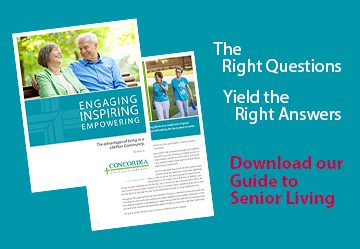
Recognizing the Signs of Dementia
What is Dementia?
Dementia is defined as chronic or persistent disorder of the mental processes caused by brain disease or injury and marked by memory disorders, personality changes and impaired reasoning. It is not a specific disease but rather a general term, which can describe a wide variety of symptoms related to memory decline in older adults. Although there are many forms of dementia affecting seniors, Alzheimer’s disease accounts for 60-80% of cases.
As we age, many adults experience memory loss issues. However, this does not mean they have Alzheimer’s or other related dementias. Aging experts have determined that small lapses in memory, or “senior moments” as they are commonly referred to, are a normal part of the aging process.
The Difference Between Normal Memory Loss and Dementia
It can be challenging to recognize what is a typical “senior moment” and what may be a sign of dementia. Review the common signs of normal memory loss vs. dementia symptoms below:
Normal Memory Loss:
There are various reasons for cognitive decline in seniors and older adults. For example, blood flow to the brain can decrease, resulting in both a reduction in cognitive skills and memory. Additionally, medical experts have proven that as we age the memory center area of the brain known as the hippocampus begins to deteriorate, affecting our ability to form and retrieve memories.
Some of the most common signs of the normal memory loss associated with aging are:
- Forgetting why you walked into a certain room
- Not remembering where you placed certain items, such as your wallet or glasses
- Confusing your loved one’s names, such as calling your daughter by your granddaughter’s name
- Difficulty retrieving information that may be on the tip of your tongue
- Trouble recalling names of new acquaintances
- Getting easily distracted, leaving projects unfinished
- Missing appointments when there is no reminder set
Engaging the brain in activity and mental stimulation, eating a healthy diet and regular exercise are known to slow the normal cognitive decline associated with aging.
Signs of Dementia:
Since most forms of dementia are progressive, meaning they gradually get worse over time, it can be difficult to get a proper diagnosis in the early stages. It is important to consult a doctor if you believe you or your loved one may be showing signs of dementia or Alzheimer’s disease, which include:
- Neglecting to take part in activities you’ve always enjoyed because you’ve forgotten the steps or the rules, such as knitting or your weekly card game with friends, which often leads to social withdrawal
- Difficulty recalling the details of recent events, such as confusing times and places
- Making poor life choices or displaying poor judgment, falling victim to scams targeting seniors
- Becoming disoriented or lost in familiar places
- Mixing up or misusing words, or trouble recalling the correct name for everyday objects
- Forgetting a loved one’s name altogether
- Difficulty performing everyday tasks, such as dressing, grooming or managing finances
There is no one test to diagnose if someone has dementia. Medical professionals determine a diagnosis of dementia or Alzheimer’s by carefully examining medical history, physical abilities, laboratory results and characteristic changes that affect one’s ability to perform day-to-day functions. Recognizing the signs earlier and consulting a doctor are key to starting proper treatment to slow the onset of Alzheimer’s and dementia.
Memory Support at Concordia
Concordia Senior Living offers a unique structured to promote resident confidence in a safe and home-like environment. With active participation in memory-focused activities and our compassionate staff, Concordia creates an atmosphere for all of our residents – from independent living to memory care – to live life to the fullest.
To learn more about memory care services in Oklahoma City at Concordia, contact us today by calling (405) 926-3366.
Caregiving

